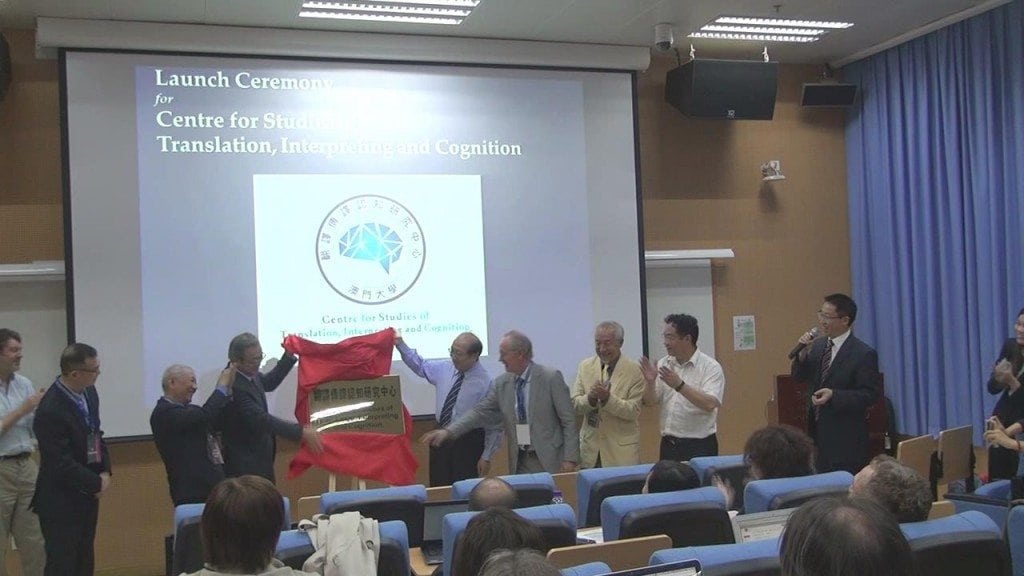
The Center for Studies of Translation, Interpreting and Cognition (CSTIC), which is under the University of Macau’s (UM) Faculty of Arts and Humanities (FAH), was inaugurated last month during the two-day International Workshop on Biological Foundations of Languages hosted by the CSTIC. The mission of the CSTIC is to probe into the underlying cognition of translation and interpreting.
Reaffirming UM’s aspiration to become a world-class university, leaders from the academic community who officiated at the opening ceremony pointed out that the multidisciplinary initiatives that bring the humanities, natural sciences, and social sciences together has happened in the right place at the right time.
UM Rector Wei Zhao addressed the inauguration ceremony for the CSTIC and the opening ceremony of the workshop. “The new campus became operational just two months ago and the event is the very first of its kind happening here,’ noted Rector Zhao. “We’ve been determined to build a campus for a world-class university since we decided to build the new campus. One thing that all first-class universities have in common is that they always have first-class departments/centers in their own mother-tongue languages. We have three mother tongues here in Macao, namely Chinese, English and Portuguese. So we’re determined to build up our Faculty of Arts and Humanities, especially the Departments of Chinese, English and Portuguese.”
“As for sciences, one of the major sciences for the 21st century is life sciences. So we have established the Faculty of Health Sciences dedicated to research and teaching of life sciences. This workshop is right at the intersection of languages and life sciences. We hope that such platforms would help us build a better university to serve Macao, and hopefully we will become a world-class university one day,” the rector observed.
Academic leaders who officiated at the ceremony included Prof Haydn Chen, vice rector of UM; Prof Xu Jie, associate dean of the FAH; Prof William Shi-Yuan Wang, director of the Joint Research Centre for Language and Human Complexity at the Chinese University of Hong Kong (CUHK); and Prof Li Defeng, director of the CSTIC.
Prof Martin Montgomery, interim dean of the FAH, remarked that if language itself is complex, then how one encodes – not just from meaning to form – but also how one recodes between one form and another in real time – is possibly the most complex of all human activities. “To study this process will require skills and insights from more than one discipline and thus, in setting up the Centre for Studies of Translation, Interpreting and Cognition, we are creating a cross-disciplinary platform for these insights to come together. And it is especially apt, I believe, that we do so in the context of a meeting on Biological Foundations of Languages,” said Prof Montgomery.
Prof John Corbett, head of the Department of English, pointed out that Translation Studies has firmly established itself alongside Linguistics and Literary Studies as one of the three pillars of the Department of English at UM. “It is extremely satisfying to me and to the department to be able to celebrate the launch of this interdisciplinary research platform in the company of scholars participating in the workshop,” said Prof Corbett. “Hosting international workshops of this kind is also a fantastic way of stimulating the research culture of UM.”
Introducing the aims and missions of the CSTIC, Prof Yuanjian He of the English Department, who initiated the establishment of the centre, stressed that it has been the very type of research that is directly relevant to the global effort of the 21st century trying to unveil the intriguing and mysterious workings of the brain, particularly those that have to do with language processing.
Co-organised by the newly-established CSTIC, the University System of Taiwan, and CUHK’s Joint Research Center for Language and Human Complexity, the workshop attracted 47 scholars from the United States, Spain, Israel, Finland, mainland China, Taiwan, Hong Kong, and Macao. It highlights four themes: language and gene, language and reading, language and neuroscience, as well as language and language impairment.
澳門大學人文學院翻譯傳譯與認知研究中心日前正式成立,並在“語言的生物基礎國際工作坊”上舉行隆重揭幕。中心旨於專研翻譯和口譯中的認知問題,主張融會人文科學、自然科學和社會科學不同範疇的知識、理論和方法進行跨學科研究。
澳大校長趙偉教授致辭時表示,世界一流大學有一共同之處,就是都有一流的母語研究語言學系/中心,而澳門作為國際城市,以中、英、葡三語為母語,故澳大銳意於人文學院設中文系、英文系和葡文系,以貫徹澳大矢志成為世界一流大學之願景。人文學院代院長Martin Montgomery教授則表示,語言運用可能是人類最為複雜的活動,運用過程中不但需要處理意思和句子結構,更講求按實際情境重新組織語言符號,以應付日常所需。研究語言的過程,不能單靠某一學科的理論,而是需要運用跨學科的知識和理論作綜合分析,翻譯傳譯與認知研究中心因此應運而生。
此次工作坊由新成立的翻譯傳譯與認知研究中心、台灣聯合大學系統、香港中文大學語言與人類複雜系統聯合研究中心合辦,共吸引了47位來自美國、西班牙、以色列、芬蘭、中國內地、台灣、香港和澳門學者參與,探討語言與基因、語言和閱讀、語言和神經學,以及語言和語言障礙。主持該研究中心開幕禮的還有澳大副校長(學生事務)程海東教授、人文學院副院長徐杰教授,香港中文大學語言與人類複雜系統聯合研究中心主任王士元教授,澳大英文系系主任John Corbett教授、翻譯傳譯與認知研究中心主任李德鳳教授,以及倡導在澳大英文系建立該中心的何元健教授等。
新聞來源:人文學院
媒體聯繫:
澳門大學傳訊部
李巧雲 電話:(853) 88228004
霍雅芝 電話:(853) 88228006
電郵:prs.media@umac.mo
澳門大學網頁:www.umac.mo

